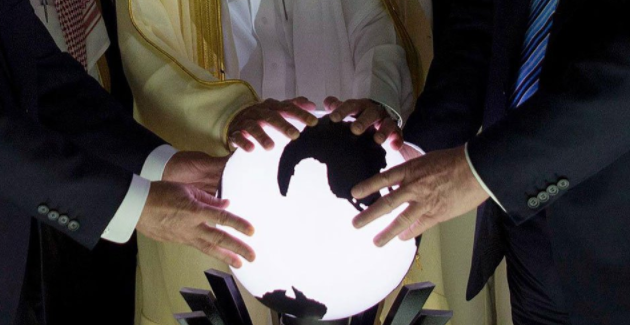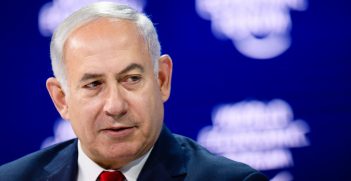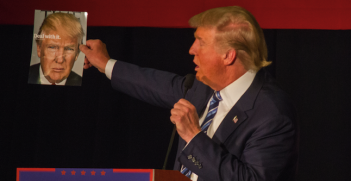Just Bomb Your Way Out of Scandal

Richard Nixon and Bill Clinton both tried to use national security issues to put a lid on political scandals. President Trump, facing ongoing scandal, may likewise make brash foreign policy to distract the media.
US allies must question just how close to get with President Trump and his administration during these turbulent times in Washington. The two most high profile presidential political scandals in recent memory, President Nixon’s Watergate and President Clinton’s relations with Monica Lewinski, influenced America’s foreign policy agenda as the beleaguered presidents tried to change the news cycle. Likewise, President Trump’s foreign policy to this point comes from the presidential playbook for foreign policy in times of scandal, and he will likely stay on this path.
The Nixon, Clinton and Trump administrations have all utilised the phrase ‘national security’ as a cloaking mechanism to progress political agendas that would ease the media coverage of their respective scandals. In 1973 a Foreign Policy article criticised the use of the phrase to cover up the scandal on the horizon. The authors stated that, “In Washington, in the season of Watergate, ‘national security’ was being defined by domestic hatreds, and, ironically, the biggest losers seemed to be those who take a Nixonian view of the world.” Nixon repeatedly claimed that his recordings were a matter of national security and that investigations regarding the recordings should stop immediately. Likewise, President Clinton used ‘national security’ as an excuse to invade Haiti in 1994, arguing that the institution of a democratic regime in Haiti would promote prolonged regional stability in the Caribbean. While Clinton’s public rationale for invading Haiti was noble, it is widely speculated that the invasion and occupation of Haiti was an attempt to make the Monica Lewinski scandal blow over.
Similarly, President Trump has labeled his travel bans, the proposed construction of a wall along the US-Mexico border and the maintenance of manufacturing in the United States as high ranking national security issues. These priorities can seem questionable compared to other national security concerns. President Trump has yet to support Article 5 of the NATO agreement despite a resurgent Russia. Likewise, President Trump has suggested that South Korea and Japan, two pillars of America’s security architecture in Northeast Asia, should fend for themselves as North Korea continues to develop its nuclear weapons program. President Trump’s public hierarchy of national security concerns is likely very different to those which the president and his advisors discuss behind closed doors. However, as the president continues to face public scrutiny throughout the ongoing special investigation process, several national security agenda items could allow him to alter the political narrative that the media will continue to construct about his administration.
One of the president’s potential foreign policy options that could change the news cycle could be the deployment of more US troops to Afghanistan. It has been reported that the President is considering deploying another 3,000-5,000 troops to the country to combat the Taliban and ISIS. This response would be an ostensibly logical policy option considering that the fighting season is about to begin and the Afghan national army is struggling with the resurgent Taliban. An additional 5,000 troops deployed to Afghanistan would bring the US total to 13,400 soldiers in the country: a drop in the bucket compared to the 100,000 military personnel there at the peak of the US presence in the country. However, while 5,000 more US soldiers in Afghanistan would provide little improvement to Afghan security, it would have the potential to change the news cycle for at least several days.
Additionally, the President could carry out large-scale aerial campaigns against terrorist organisations in Syria, Iraq or Afghanistan. President Trump has already shown a willingness to do this, ordering 59 tomahawk cruise missile strikes on Syria and dropping the 21,000 pound (9,525 kg) MOAB bomb onto an ISIS training camp in Afghanistan. Both attacks were carried out in the wake of leaks regarding his administration’s connections and potential collusion with Russia. While these strikes had little strategic impact—the Syrian Air Force was flying from the bombed airfields the very next day—they did alter the news cycle. Thus, if more information were to come out regarding the President’s collusion with Russia, or if a new scandal were to emerge, the President could combine the deployment of troops with an aerial bombing operation in Afghanistan ostensibly to address the security situation there while shifting attention at home.
Lastly, the president has the option to carry out aggressive naval exercises near the Korean Peninsula. The combination of nuclear proliferation and political hostility between North Korea and its neighbours has many on edge. Likewise, every North Korean missile test garners significant media attention in the US. Carrying out unannounced naval exercises near North Korea would accomplish two goals. Firstly, it would exhibit US military might to adversaries and allies in the region; this display of force would hopefully deter further escalation of tensions in the near future. Secondly, the ambiguity of unannounced naval exercises would catalyse debate among the news networks: it could appear that the US was on the cusp of nuclear war. The two outcomes of deterring North Korea and changing the news cycle would be positive for the White House.
The President’s chief strategists, especially Steve Bannon, have likely noticed that the media response to the tomahawk missile strike in Syria and the dropping of the MOAB bomb in Afghanistan diverted attention from White House scandals. Like Presidents Nixon and Clinton, President Trump and his team may employ similar strategies moving forward and engage in diversionary operations to distract from the scandals that have plagued the administration.
Trevor Alexander is an intern with the AIIA National Office. He is currently completing a Master of Strategic Policy at the Crawford School of Public Policy at the Australian National University.
This article is published under a Creative Commons Licence and may be republished with attribution.





